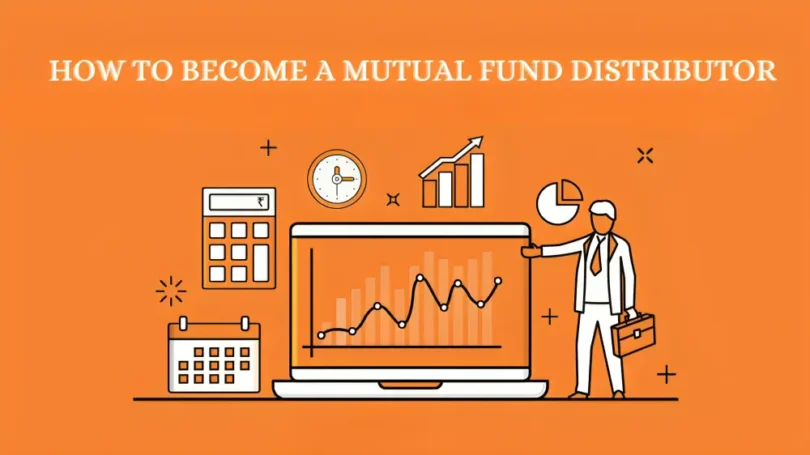Embarking on the journey to become a Mutual Fund distributor is a strategic career move in the financial sector. This comprehensive guide navigates aspiring individuals through the intricate steps involved in acquiring the necessary skills and certifications. Starting with an understanding of financial markets and investment instruments, the process delves into the regulatory requirements and licensing procedures. Aspiring distributors will gain valuable insights, empowering them to navigate the financial landscape with confidence and competence.
What is a Mutual Fund Distributor?
An intermediary that helps investors buy and sell mutual funds on the Indian financial market is known as a mutual fund distributor. They are regulated by the Securities and Exchange Board of India (SEBI) and the Association of Mutual Funds in India (AMFI).
These middlemen, commonly known as mutual fund agents, help investors understand the different kinds of mutual fund schemes that are offered in India. Additionally, it helps investors with the acquisition, exchange, and redemption of their assets. Mutual fund distributors receive compensation for their work, just like agents in the insurance industry.
Novice investors may be unaware of the paperwork related to mutual fund investments. Mutual fund distributors assist customers in meeting documentation needs while protecting confidential records.
Why do Mutual Funds Need Distributors?
Brokers act as liaisons between the mutual fund scheme and the final investor. Customers may occasionally need to comprehend the intricacy and suitability of a new product. Here, a mutual fund distributor assists prospective customers with transactions and explains the advantages of the mutual fund plan.
Sabse Jyada Return Dene Wala Mutual Fund
Different types of Commission for a Mutual Fund Distributor
Trail commission: The mutual fund distributors’ main source of income is trail commission, which allows them to take home as much as two percent of the total assets under management. Upon keeping the investment in the fund, the fee is calculated based on the assets under management (AUM).
B-30: MFDs can offer Master B-30 incentive commissions on new investments for the first year when they sell mutual funds to investors in B-30 cities. It is included with the standard commission rates. In addition, a T30 commission is provided by AMFI for the sale of mutual funds to investors.
Role of Mutual Fund Distributor
Help in the risk tolerance assessment: Distributors of mutual funds help investors determine how much risk they can tolerate. This is crucial for mutual fund investing because it establishes which kind of mutual fund is best for a given investor’s portfolio. Additionally, investors with a lower tolerance for risk may find value in debt or index funds; more aggressive investors may choose to include equity funds in their portfolios.
Promoting awareness among investors: Fund distributors are essential in raising investor knowledge and awareness of this industry. Investors should consider several factors before investing in a fund, including the fund’s type, costs, and expected return. Both novice and seasoned investors can get their questions and concerns about the market addressed by distributors.
Analysis of investment options: Selecting a quality mutual fund can be difficult for investors. Examining the funds’ shortlist is crucial. Mutual fund distributors are essential in assisting investors in this regard. They keep an eye on financial news and evaluate its implications for different economic developments.
Creating Investment Strategies: After an investment analysis, the next stage in this process is to develop an investment strategy with fund distributors. They are intended to help align the strategy with the goals and needs of the client; they may also aid in portfolio diversification among various mutual fund schemes.
How to Become a Mutual Fund Distributor?
- Acquire a Tax Deduction Account Number (TAN) and a Permanent Account Number (PAN). To register with the Securities and Exchange Board of India (SEBI), these are required.
- You must be eighteen years old and have earned a three-year diploma from class 10 or class 12.
- ace the certification test for NISM Series V-A.
- The Association of Mutual Funds in India (AMFI), which oversees the distribution of mutual funds in the nation, can be contacted to obtain the ARN.
- Apply for distributorship and enroll with a mutual fund company.
- Acquire a current insurance policy. It will allow you to safeguard the investments of your clients in case of unanticipated events.
- Respect the rules of behavior established by AMFI.
FAQ’s
Q1. What is the commission paid to a distributor of mutual funds?
Ans. The commission on mutual funds ranges from 0.1% to 2% of the total number of units that investors buy.
Q2. What requirements must a distributor of mutual funds meet?
Ans. Although distributors for mutual funds can be anyone over the age of 18, most employers prefer graduates with extensive experience in this area. The corporate entity is also required to offer product training before mutual discoverer registration.








Leave a Comment